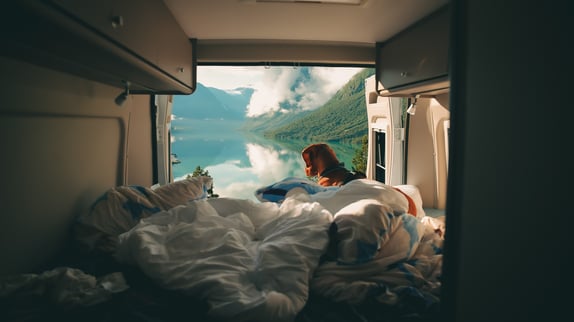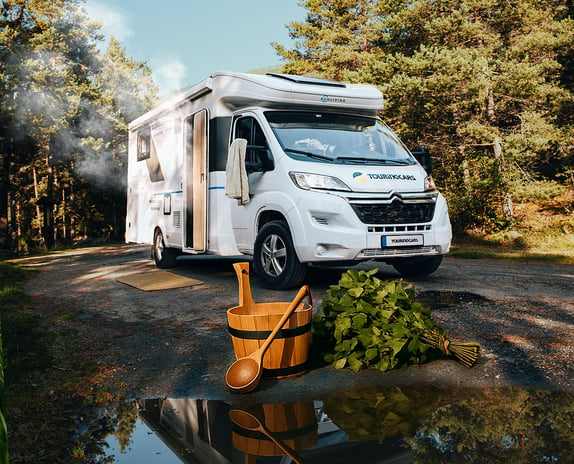Official Regulations and Rules on the Road in Sweden
List of practicalities for TC customers shared by ATCF, the Automobile and Touring Club of Finland
One of Touring Cars' partners, the Automobile and Touring Club of Finland (ATCF), wants to share a list of practical tips for road trippers in Northern Europe. This second article covers official regulations in Sweden.
Traffic Information
Information on the road conditions and construction on E-roads or national highways can be found on the Swedish Road Administration's website at www.trafikverket.se (Operations/Traffic Information). Traffic information can also be obtained through the V-Traffic or Waze applications.
There is right-hand traffic in Sweden. One must avoid coming from the right unless otherwise indicated. Many roads have additional space on the side of the lane. Slow vehicles are permitted to move temporarily to that area to facilitate the passage of faster vehicles. However, a slow vehicle is not obligated to move to the side of the road.
On narrow roads, the "M" sign is used, i.e. a white capital letter M on a blue background. The sign indicates that there is a wider spot on a narrow road where two vehicles driving in opposite directions can bypass each other (mötesplats, bypassing point).
Speed limits inside towns are 30-50 km/h and outside town area, the limits are 80 km/h on roads or up to 110 km/h on the motorway. Vehicle-specific speed limits outside urban areas. The road-specific restrictions may be lower than this, so you should follow the traffic signs carefully.
The police have the right to impose a traffic fine and collect a small fee on the spot. Fines issued based on automatic camera surveillance are sent to the driver's home address.
Roads and Road Tolls
European roads, national highways, and roads connecting one province to another are in good condition. Most of these roads are paved. In the spring, some roads may be closed or weight restrictions may be imposed due to frost damage. The roads are kept clear of snow even in winter unless the weather conditions are quite exceptional.
In Sweden, infrastructure charges (Infrastrukturavgifter) and congestion charges (Trängselskatter) are applied on public roads. Both Swedish and foreign registered vehicles are subject to bridge tolls, i.e. infrastructure tolls in Motala, Sundsvall, and the Skuru Bridge (Skurubron) between Stockholm and Nacka. In Stockholm and Gothenburg, a congestion tax is charged from Monday to Friday from 6:00 a.m. to 6:29 p.m. for cars, trucks, and buses weighing less than 14 tons. The fee is not charged on Saturdays, Sundays, public holidays, on the eve of public holidays, or in July (except in Stockholm, it is charged on the first five weekdays of July). The fee also applies to cars registered abroad. TC Rental Station team in Stockholm will guide you on how to handle additional tolls on your journey in Sweden.
Diesel is not always sold from automatic pumps, but the diesel filling point may be separately in the backyard of the gas station. Northern Sweden has a sparse service station network. Motorists are recommended to familiarize themselves with the locations of gas stations along the route in advance. Try online service: Husbilsplats.se
Based on the Schengen Agreement, there are no border checks (i.e. checks of travel documents) at the borders of Finland, Denmark, Sweden, and Norway. Border control in Sweden is the responsibility of the border police (Gränspolisen). However, border checks can be temporarily arranged if the security situation requires it. If you plan to tour also in other countries than the one from which you have picked up your rental vehicle, please remember to notify our local team. They will guide you through all necessary tips for a motorhome in each country.
There are several ferry connections from Sweden to Finland, Denmark, Estonia, Latvia, and Lithuania. To find a suitable ferry connection to your road trip, please do a Google search. Some small distance ferryboats take you directly across the bay. To see those local connections, please visit Trafikverket.se.
Safety Issues
Required documents to have on your holiday:
- Passport or identity card: If necessary, proof of identity must be provided
- Driver's license (only B level is needed with a motorhome)
Recommended documents for European citizens:
- European Health Insurance Card
- Insurances
Headlights must always be used while driving. Fog lights may be used in dense fog, heavy rain, or snow, but not together with low-beam lights.
Do not mix drinking and driving on your road trip. In Sweden, alcohol laws are strict, and penalties for driving under the influence are severe. The legal limit is 0,02% blood alcohol and applies to the driver of any motorized vehicle. Avoid also medications marked with a red triangle if you intend to drive.
Emergency numbers
- Police 112
- Ambulance 113
- Fire Department 110
In case of an accident personal injuries or extensive material damage, a report must be made to the police and the rescue service. Accidents in which a wild animal is injured or killed must always be reported to the police the numbers 112 or 114 14. The notification must be made even if the animal is not injured.
Camping with a motorhome
There is no law against sleeping in a vehicle that is legally parked in a public place (must be inside the marked parking space). However, there may be such prohibitions in the local ordinances (allmänna ordningsföreskrifter). Thus, it is permitted to spend the night in a motorhome in those parking areas or rest areas that do not have an overnight ban or are not restricted e.g. only to small passenger cars. You can request an overnight stay permit from the landowner. In general, wild camping with a motor vehicle is not an Everyman's right, unlike camping.
Nowadays, there are quite a few travel parks in Sweden, i.e. "ställplats" locations for motorhomes to stay.
- Travel parks https://husbilsplats.se/hitta-stallplatser-for-husbilar/ and https://husbilsplats.se/hitta-bokningsbara-stallplatser-for-husbilar/
- Parking for short stay https://husbilsplats.se/hitta-rastplatser-for-husbilar/
It is also possible to spend the night at around 270 roadside rest areas maintained by the Swedish Transport Agency (Trafikverket), although the rest areas are not considered travel parks. You may stay in the rest area for a maximum of 24 hours. See more at www.trafikverket.se/resa-och-trafik/vag/rastplatser or https://www.trafikverket.se/
- Replacement bottles or filling points for tank bottles or fixed gas containers in Sweden marked on the map: https://maphub.net/Sjoberg/lpg or https://husbilsplats.se/hitta-gasolpafyllning/
- Spots for a freshwater: https://husbilsplats.se/hitta-farskvattenpafyllning/
- Spots for electricity: https://husbilsplats.se/hitta-elplatser-for-husbilar/
- Emptying grey water or toilets: https://husbilsplats.se/hitta-tomningsplatser-for-husbilar/
Alternatively, you can find services on some mobile applications such as Park4night. Additionally, we recommend reading good travel tips from Visit Sweden:
- https://visitsweden.com/what-to-do/vanlife-travel/vanlife-practical-guide/
https://visitsweden.com/where-to-stay/camping/five-star-campsites/
Enjoy your road trip in Sweden - the Road is Yours!
We want to thank our partner, the Automobile and Touring Club of Finland (ATCF) for sharing this essential guideline with us. ATCF is the only nationwide association of private motoring in Finland. The association is called AL Autoliitto in Finnish and this organization is a member of FIA, Fédération Internationale de l'Automobile. Touring Cars and ATCF are collaborating in Finland: https://www.autoliitto.fi/jasenedut/touring-cars-finland/. ATCF in Finland publishes a magazine for motorists: https://moottori.fi/.
- Original Source & Copyright: The Automobile and Touring Club of Finland (ATCF) / AL Autoliitto, Susanna Suokonautio-Hynninen
Translation & some TC notes have been added: Touring Cars Motorhome Rental Europe













